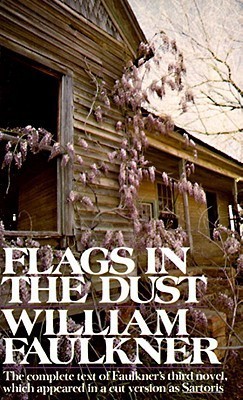What do you think?
Rate this book


418 pages, Kindle Edition
First published January 1, 1973


William Faulkner at the University of Virginia, 1957
"No man is himself, he is the sum of his past.”
Faulkner in the University, University of Virginia Press, 1995




Thus each opening [of the chest] was in a way ceremonial, commemorating the violent finis to some phase of his family's history, and while he struggled with the stiff lock, it seemed to him that a legion of ghosts breathed quietly at his shoulder, and he pictured a double line of them with their arrogant identical faces waiting just beyond a portal and stretching away toward the invisible dais where Something sat waiting the latest arrival among them; thought of them chafing a little and a little bewildered, thought and desire being denied them, in a place where, immortal, there were no opportunities for vainglorious swashbuckling. Denied that Sartoris heaven in which they could spend eternity dying deaths of needless and magnificent violence while spectators doomed to immortality looked eternally on. The Valhalla which John Sartoris [died 1872, as described in Unvanquished], turning the wine glass in his big, well-shaped hand that night at the supper table, has seen in its chaste and fragile bubble.The story is set in the years immediately following World War One, which were years of change in the Mississippi towns and countryside -- a change symbolized by Bayard III's convertible racing along the dirt roads scaring the livestock and horse-drawn carriages. Traditional modes of life are slowly vanishing, particularly in the adulterous relationship that develops between Horace Benbow and Mrs. Belle Mitchell, while Horace's sister Narcissa, like a throwback to the relative calm of an earlier time, finds herself falling in love for the self-destructive young Bayard. At one point, Faulkner gives us a frightening glance into the young man's mind:
Nothing to be seen, and the long long span of a man's natural life. Three score and ten years, to drag a stubborn body about the world and cozen its insistent demands. Three score and ten, the Bible said. Seventy years. And he was only twenty-six. Not much more than a third through it. Hell.Probably part of what early publishers disliked about the novel was its broad-spectrum approach encompassing the Black population, rural good-old-boys like the McCallums, and the creepiness of Byron Snopes's pursuit of Narcissa Benbow. One chapter I particularly liked was young Bayard's stay at his old childhood friends, the McCallums, to go hunting possum. He is too ashamed to tell them that his father is dead, partly due to his reckless driving. He accepts a jug of moonshine to give to him without divulging the truth.